Summa Elvetica: A Casuistry of the Elvish Controversy and Other Stories Read online
Praise for Selenoth
“This is a book designed with a single primary purpose, to revive epic fantasy as a rooted form, and most readers of fantasy are going to receive this story as such. They will not be disappointed.... A THRONE OF BONES is doorstopping fantasy for far more than its physical dimensions. Metaphysically, it shuts the door to the world we know and provides an escape to a better reality, and one far more dangerous than the one in which we now dwell.”
—DANIEL ENESS
“A THRONE OF BONES, by Vox Day, is one of the more ambitious epic fantasy novels I have read.... I enjoyed the historical verisimilitude of the novel, especially the depiction of the Amorran republican legions.”
—JONATHAN MOELLER, PULP WRITER
“It's a delightful experience.... There are beautiful moments, there is clever dialogue, there is deep mystery. It took some level of genius to write it.”
—THE RESPONSIBLE PUPPET
“If the author can successfully complete at least a trilogy from this world he has created I think it can stand to become one of the great SF/F series, and garner him accolades along with Martin, Tolkien and other fiction greats.”
—ZERO SUM
“I've read every one of the books in A Song of Ice and Fire, and this beats the pants off all of them. Even A Storm of Swords. Seriously. It's that good. This book works because it doesn't pretend to be more than it is—an epic historical fantasy novel.”
—DIDACT'S REACH
“All I can say to my fantasy-loving brethren is that you MUST read this.... It's amazingly well done.”
—Amazon Review of A THRONE OF BONES
“One of the best SF/F novels of the past decade, if not longer.”
—Amazon Review of A THRONE OF BONES
Summa Elvetica: A Casuistry of the Elvish Controversy and Other Stories
by Vox Day
This edition also contains stories previously published in A Magic Broken, The Wardog's Coin, and The Last Witchking.
Published by Castalia House
Kouvola, Finland
www.castaliahouse.com
This book or parts thereof may not be reproduced in any form, stored in a retrieval system, or transmitted in any form by any means—electronic, mechanical, photocopy, recording, or otherwise—without prior written permission of the publisher, except as provided by Finnish copyright law.
Copyright © 2008, 2015 by Vox Day
All rights reserved
Cover Design: Kirk DouPonce
Version 004
Dedication
To the young author and the pretty princesses.
Table of Contents
Cover
Table of Contents
Summa Elvetica: The Casuistry of the Elvish Controversy
Author's Note
Master of Cats
Birth of an Order
The Last Witchking
The Hoblets of Wiccam Fensboro
The Wardog's Coin
Qalabi Dawn
A Magic Broken
Opera Vita Aeterna
Books by Vox Day
A Throne of Bones
A Sea of Skulls
Castalia House
New Releases
PROOEMIUM
Quaeritur de Aelvi per comparationem ad homines. Primo, utrum Aelvi habeant anima naturaliter sibi unita. Secundo, utrum assumant gloria. Tertio, utrum in gloribus assumptis occupant opera vita aeterna.
MARCUS VALERIUS LOOKED up from the faded Numidican manuscript in irritation. The light from the study window was growing dim. Already he’d been forced to light a candle in order to make out the obscure scratchings of the historian Quintus the Elder, whose colorful accounts of his encounters with the pagan desert tribes were as dubious as they were vivid. The imperative knocking at the door threatened a lengthy interruption, one that might cost Marcus what little daylight remained.
“Come in,” he called, resigned.
The latch creaked, and a familiar, sun-bronzed face peered around the corner of the door. It belonged to his cousin Sextus, whose brown eyes were dancing with mischief.
“This better be good,” Marcus warned him. “I was just getting to the part where the tribal chief is about to sacrifice the centurion to his devil-gods.”
Sextus nodded absently. “Oh, yes, you said you were going to read up on old Quintus, didn’t you? Well, if it’ll save you some time, I’ll tell you how it ends. The legions march in, the heathen see the error of their ways, and the great city-state of Amorr triumphs over all. Hallelujah and amen!”
Marcus stared at him and, with some difficulty, rejected the first three responses that leaped to mind. “Thank you, Sexto. Your help is … beyond words. Now, go away, please.”
His cousin grinned back at him. Maddeningly, he did not leave, but rather folded his arms and leaned against the edge of the entryway.
Sexto was half a hand shorter than Marcus, but with a slim build that made him appear taller than he was. Like Marcus and the rest of their family, his eyes were dark brown, but he was no scholar, and his skin was deeply bronzed by the sun. He wore a plain white tunic devoid of any equestrian stripes. He was barefoot, and his belt was an unadorned strip of worn leather. Besides the intrinsic arrogance that radiated from him like heat from a fire, only the finely carved silver buckle clasping the belt showed any sign that he was a senator’s son, let alone a Valerian.
“Don’t you want to know why I’m here?”
“To plague me?” Marcus guessed. “To keep me from my learning?”
Sextus steepled his hands and did his best to appear pious. The effect would have worked better if he had stopped smirking first. “I’m here in my priestly capacity, believe it or not. The Father Superior sent me with a message for you. You’re to go before the Sanctiff.”
“What?” Marcus was sure he hadn’t heard correctly. “I’m supposed to go where?”
“To the Sanctiff,” Sextus repeated. “Yes, you, and right away too. Father Aurelius is already on his way here—he’s to escort you to the palace.” He grinned and arched his eyebrows. “Now tell me what you did to get in that kind of trouble, Marco! Did I miss out on something?”
Marcus swallowed hard. This wasn’t just impossible, it was beyond imagining. The Holy Sanctiff was the highest ranking official in the land since Amorr had no king. Officially, the Lord God Himself ruled over the Republic. However, as the earthly head of the Amorran Church, the Sanctiff was God’s voice and viceroy from the banks of the Tiburon to the shores of the Rialthan Sea.
Marcus had no idea why the viceroy of God Almighty wanted to see him. No idea at all.
The Holy Palace was the greatest structure in Amorr, as was only fitting. It boasted twelve spires ringing one massive cupola, a representation in marble of mankind’s Savior and His twelve disciples. Marcus, with Father Aurelius by his side, was being escorted into it by the palace’s hard-faced soldiers with their red cloaks.
To Marcus’s relief they did not march him into the Hall of Judgment. That place was dreaded by every sane and sober Amorran. He had first feared they were taking him there to stand before some inquest. Instead, the guards conducted them to what appeared to be a small, private antechamber just off one of the palace’s central corridors.
The room was dark, lit only by seven guttering rushlights. It was cool, but not cold, and two of the stucco walls were obscured with wooden shelves that held fat scrolls of various lengths. Marcus couldn’t see the back wall behind the lights, but he stopped looking about the room when his eyes alighted upon an elderly man sitting
alone in its center.
His Holiness was reclining on an unimposing, leather-wrapped chair that looked as comfortable as it was worn with age. He wore none of the trappings of his awesome office, only the simple blue robe of a Jamite brother. The robe was darker than his cerulean eyes, which were encased by thin folds of sagging flesh and surmounted by a pair of bushy white eyebrows. But he smiled warmly at his visitors, and Marcus could easily have thought of him as someone’s good-humored pater familias were it not for the gem-encrusted ring of office adorning his left hand.
“Thank you for coming, Father Aurelius.” The Sanctiff’s voice was deep, but to hear it up close in this small room instead of echoing off the marble of the palace steps made it seem more friendly than intimidating. “I have received excellent reports of your work with the junior scholastics. And welcome, Marcus Valerius. I wished to see with my own eyes the latest prodigy of the Valerian House. Perhaps you shall do for the Church what your illustrious forebears have done for Amorr’s legions, hmmm?”
Marcus blushed before the Sanctiff’s praise. It was as if the old man had seen into his mind and read his deepest, most hidden desires. “Thank you, your Holiness. I seek only to serve God and Amorr, to the best of my small abilities.”
The Sanctiff’s aged lips wrinkled in a wry smile, and he glanced toward the shadowy corner of the room. “Admirably courteous, is he not? I should think any concerns regarding his comportment are groundless. Don’t you agree, Caecilus Cassius?”
Marcus drew in a sharp breath as a thin-faced man in a black robe emerged from the darkness, accompanied by a cheerful-looking Jamite priest in the blue robe of his order.
Marcus knew the man whom His Holiness addressed so familiarly. Or rather, he knew of him. Caecilus Cassius Claudo was the Bishop of Avienne and one of the Church’s leading intellectuals. His famous treatise, the Summa Spiritus, written on all the diverse races of Selenoth and their distinct places in the Will of God, had sparked a raging flame of debate that still roared through every scholastic circle in the Republic. Marcus himself had written a short commentary on the Summa less than a year ago.
“That remains to be seen, your Holiness.” Claudo’s arid voice was acerbic and high-pitched. “Certainly, a number of his expressed opinions are impudent in the extreme.”
“Oh, come now, Claudo,” the Jamite broke in, laughing. His round face was ruddy, and Marcus liked him immediately. “A refusal to abase himself before your lofty eminence does not indicate an inclination toward boorish behavior. Why, it’s nothing more than a sign of sheer good sense!”
He smiled broadly, making it clear that he was only teasing his proud colleague, thengraciously inclined his head toward Marcus and Father Aurelius. “Since His Holiness does not see fit to introduce us, I shall take the matter in hand myself. I am Quintus Servilius Aestus, a humble priest in service to the Lord Immanuel and, of course, His Holiness. My distinguished colleague is none other than His Excellency, the Bishop of Avienne, whose work I believe you know quite well.”
Father Aestus shook their hands warmly, first Father Aurelius’s, then Marcus’s own. Marcus was in awe, for he was truly in the presence of greatness—not once, not twice, but three times over. Father Aestus was one of the few intellectuals who dared to publicly cross wits with the famed bishop, and he was rumored to be working on his own magnum opus in opposition to Cassius Claudo’s masterpiece.
The Sanctiff cleared his throat, and Father Aestus smoothly effaced himself, but not before directing a disconcerting wink at Marcus.
“Father Aurelius, you know why I have summoned you,” the Sanctiff stated, “and your presence here answers the question I posed to you earlier. However, Bishop Claudo and Father Aestus have their own questions for your young scholar, and with your permission, I would allow them to inquire of him.”
“Of course, your Holiness,” Father Aurelius replied obediently. He was an astute man and did not need to be told when his presence was not required. “May I have your permission to withdraw, your Holiness?”
“Go with God, Father,” the Sanctiff said, extending his left hand. “And the grace of our living Lord be upon you.”
Father Aurelius bent over and kissed the sacerdotal ring of office, then gave Marcus a reassuring pat on the shoulder as he left the room. Marcus suddenly felt alone and intimidated, surrounded as he was by three of the republic’s most formidable minds.
Bishop Claudo’s dry voice broke in on his thoughts. “Marcus Valerius, I have read your commentary on the Summa Spiritus. It is … not without merit. But when you say that one does not know, indeed, that one is not even capable of knowing, whether a particular form or being possesses an immortal soul, are you not treading perilously near a concept that could easily be construed as heresy? Or is this passage nothing more than the sophomoric pedantry of a young scholar who has manufactured a reason to doubt the immutable fact of his own existence?”
Marcus gulped. Claudo was cutting straight to the point. Are you a heretic or a fool, boy? That was the real question being posed to him now. The Church didn’t burn heretics at the stake anymore, but nevertheless he knew he had to be very careful about what he said next. He closed his eyes and thought quickly before answering.
“Only a philosopher or a fool doubts his own existence, Excellency,” he said. “It is true, however, that the two all too often prove to be one and the same. I assert that I am neither. The verb ‘to know’ contains a number of interpretations, and in the sentence of which I believe you are speaking, I made use of the concept in its most concrete sense, the sense in which a thing is proven beyond any reasonable possibility of doubt. As in the case, for example, of a mathematical equation.”
Marcus paused. Was that a frown clouding over the Sanctiff’s face? He shook his head, took a deep breath, and tried to clarify his meaning.
“Your Excellency, as you know, where there is surety, there is no faith, no belief, per se. And therefore, knowledge of the soul rightly belongs in the realm of faith, not mathematics.” He placed his right hand over his heart. “Do I have a soul? Yes, I believe so, with all my heart. But regardless of my faith, it is either so or it is not, as the Castrate wrote so wisely. My personal belief does not have the capacity to dictate the truth. Indeed, before the eternal truth of the almighty God, my own humble opinion is of no account.”
In the silence that followed, Claudo finally snorted and his eyes narrowed, but he did not speak. Father Aestus looked as if he were about to burst out laughing.
The Sanctiff smiled. “He has you there, Claudo. Unless you did not apprise me of a divine revelation, all your wonderfully conclusive eloquence remain just that—eloquence.”
Claudo shrugged. “It is so. And yet decisions must be made, though the decision makers befallible.” He regarded Marcus coldly and stepped back into the shadows.
Marcus stared at the carpeted floor, chagrined. He wondered what was wrong with his answer and hoped he hadn’t greatly offended the acerbic ecclesiastic.
“I too have a question for the young scholar,” Father Aestus announced. His green eyes danced impishly. “Do you ride?”
“Do I … Horses?” Marcus asked, taken aback.
“I wasn’t thinking of cows,” the Father replied tartly.
“Yes, oh, yes. Of course.”
Every Amorran nobleman rode, especially those of the Valerian house. Marcus wondered what kind of trap was being laid for him now. It just didn’t make any sense.
“I have no further questions, your Eminence.”
Father Aestus bowed theatrically to the Sanctiff and joined Bishop Claudo behind the makeshift Sanctal throne.
Marcus was thoroughly confused now. At this point he wouldn’t have been surprised if the Sanctiff suddenly leaped out of his chair and demanded that he demonstrate an ability to juggle apples.
“I anticipate no objections, then?” the Sanctiff asked the two Churchmen.
“None at all,” Father Aestus said cheerfully. Bishop Claudo slowly shook
his head in silence.
“Very well.” A smile creased the Sanctiff’s lined face, and he leaned toward Marcus. “I realize this has been a little unusual for you, my son. But I have a problem, you see, and you, Marcus Valerius, are going to help me solve it.”
“Me?” Marcus shook his head. “How could I help you, your Holiness?”
“Let me tell you about my problem first. You see, these illustrious jewels in the crown of the Church,” he nodded toward Claudo and Aestus, “have each penned a marvelous work on man and his place in this world. The Summa Spiritus you have read. The Ordo Selenus Sapiensyou have not, though Father Aestus will no doubt be interested in what you might have to say about it. In many points they are in agreement, but on one very important point they are at variance. It is that particular point which I would like you to help me settle.”
Marcus nodded. “I am yours to command, your Holiness. But what is this point of contention, and how could I ever help you settle it?”
The Sanctiff sighed wearily. “I am an old man, Marcus Valerius, and my days of seeing through this glass darkly will soon come to an end. I am sending a party to Elebrion, you see, but I fear I would not survive the trip. Therefore you, my son, shall accompany Bishop Claudo and the good Father in my stead.”
Marcus put his hand over his mouth. Now he understood what the Sanctiff had in mind, and the sobering realization of terrible responsibility hit him like a blow to the stomach.
“By the blood of the martyrs,” he cried despite himself. “You’re going to decide if the elves have souls!”
IA Q. VII A. I ARG. I
Videtur quod aelvi habeant animae naturaliter sibi unita. Dicitur enim Gen. II, Deus hominem de limo terrae, et inspiravit in faciem eius spiraculum vitae, et factus est homo in animam viventem. Sed ille qui spirat, aliquid a se emittit. Ergo anima qua homo vivit, est aliquid de substantia Dei. Subsistentes cum aelvi, et diversi homini, non acciperunt substantiam Dei ab Deo. Ergo aelvi habent animae naturaliter sibi unita.

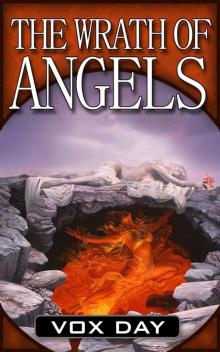 The Wrath of Angels (Eternal Warriors Book 3)
The Wrath of Angels (Eternal Warriors Book 3) SJWs Always Lie
SJWs Always Lie The War in Heaven (Eternal Warriors Book 1)
The War in Heaven (Eternal Warriors Book 1) SJWs Always Double Down: Anticipating the Thought Police (The Laws of Social Justice Book 2)
SJWs Always Double Down: Anticipating the Thought Police (The Laws of Social Justice Book 2) A Sea of Skulls (Arts of Dark and Light Book 2)
A Sea of Skulls (Arts of Dark and Light Book 2)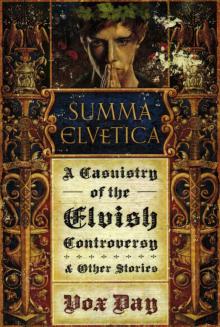 Summa Elvetica: A Casuistry of the Elvish Controversy and Other Stories
Summa Elvetica: A Casuistry of the Elvish Controversy and Other Stories The Altar of Hate
The Altar of Hate A Mind Programmed
A Mind Programmed The World in Shadow (Eternal Warriors Book 2)
The World in Shadow (Eternal Warriors Book 2) The Wardog's Coin
The Wardog's Coin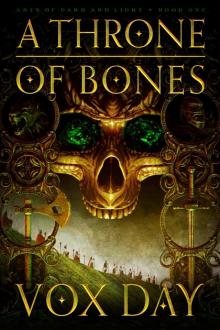 Arts of Dark and Light: Book 01 - A Throne of Bones
Arts of Dark and Light: Book 01 - A Throne of Bones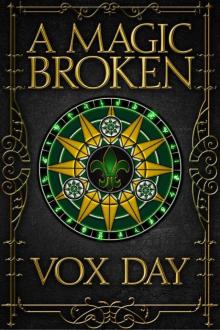 A Magic Broken
A Magic Broken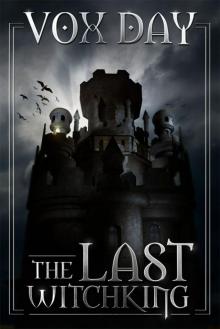 The Last Witchking
The Last Witchking